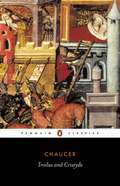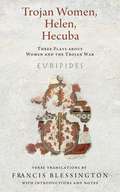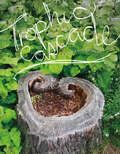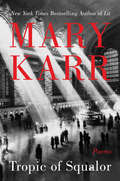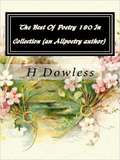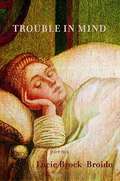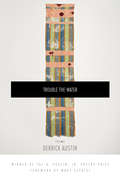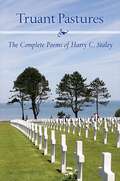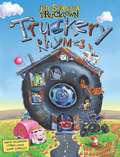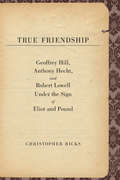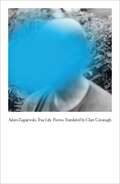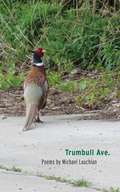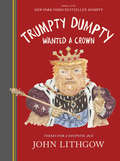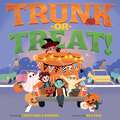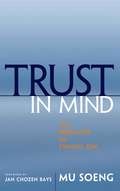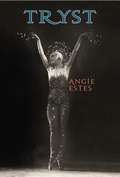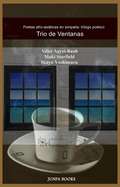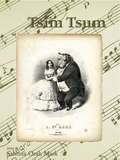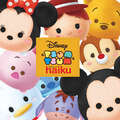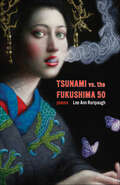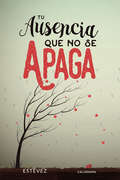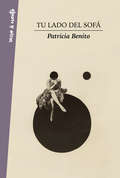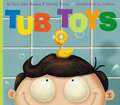- Table View
- List View
Troilus and Criseyde: The Book Of Troilus By Geoffrey Chaucer
by Geoffrey ChaucerSet against the epic backdrop of the battle of Troy, Troilus and Criseyde is an evocative story of love and loss. When Troilus, the son of Priam, falls in love with the beautiful Criseyde, he is able to win her heart with the help of his cunning uncle Pandarus, and the lovers experience a brief period of bliss together. But the pair are soon forced apart by the inexorable tide of war and - despite their oath to remain faithful - Troilus is ultimately betrayed. Regarded by many as the greatest love poem of the Middle Ages, Troilus and Criseyde skilfully combines elements of comedy and tragedy to form an exquisite meditation on the fragility of romantic love, and the fallibility of humanity.
Trojan Women Helen Hecuba: Three Plays about Women and the Trojan War
by EvripidesFrancis Blessington combines his work as a poet, translator, and teacher of literature and Greek with his theatrical experience to create fresh and faithful verse translations suitable for the stage, the classroom, or the general reader. The three plays are augmented by introductions, notes, and an appendix on elements of Greek tragedy. Blessington glosses historical and mythological terms, identifies Greek themes in the texts, offers literary interpretations, and suggests topics for discussion.
Trophic Cascade (Wesleyan Poetry Ser.)
by Camille T. Dungy&“A soulful reckoning for our twenty-first century, held in focus through echoes of the past and future, but always firmly rooted in now.&” —Yusef Komunyakaa, Pulitzer Prize-winning poet Winner of the Colorado Book Award in Poetry (2018) In this fourth book in a series of award-winning survival narratives, Dungy writes positioned at a fulcrum, bringing a new life into the world even as her elders are passing on. In a time of massive environmental degradation, violence and abuse of power, a world in which we all must survive, these poems resonate within and beyond the scope of the human realms, delicately balancing between conflicting loci of attention. Dwelling between vibrancy and its opposite, Dungy writes in a single poem about a mother, a daughter, Smokin&’ Joe Frazier, brittle stars, giant boulders, and a dead blue whale. These poems are written in the face of despair to hold an impossible love and a commitment to hope. A readers companion will be available at wesleyan.edu/wespress/readerscompanions. &“Dungy asks how we can survive despair and finds her answers close to the earth.&” —Diana Whitney, The Kenyon Review &“Trophic Cascade frequently bears witness—to violence, to loss, to environmental degradation—but for Dungy, witnessing entails hope.&” —Julie Swarstad Johnson, Harvard Review Online &“Tension. Simmering. Beneath her matter-of-fact, easy-going, sit-yourself-down, let-me-tell-it-like-it-is clarifying. And her power we take deadly seriously.&” —Matt Sutherland, Foreword Reviews &“[Trophic Cascade] asks us, in spite of the pain or difficulty of being human today, to find joy and vibrancy in our experiences.&” —Elizabeth Flock, PBS Newshour
Tropic of Squalor: Poems
by Mary KarrA new volume of poetry from the New York Times bestselling and esteemed author of The Liar’s Club and Lit.Long before she earned accolades for her genre-defining memoirs, Mary Karr was winning poetry prizes. Now the beloved author returns with a collection of bracing poems as visceral and deeply felt and hilarious as her memoirs. In Tropic of Squalor, Karr dares to address the numinous—that mystery some of us hope towards in secret, or maybe dare to pray to. The "squalor" of meaninglessness that every thoughtful person wrestles with sits at the core of human suffering, and Karr renders it with power—illness, death, love’s agonized disappointments. Her brazen verse calls us out of our psychic swamplands and into that hard-won awareness of the divine hiding in the small moments that make us human. In a single poem she can generate tears, horror, empathy, laughter, and peace. She never preaches. But whether you’re an adamant atheist, a pilgrim, or skeptically curious, these poems will urge you to find an inner light in the most baffling hours of darkness.
Troubadour of the Old 108
by H. L. DowlessEsta colección poética de temas variados es una de las que ha generado mayor respuesta en el sitio web del autor Poetry180's Allpoetry. Además, unos cuantos de estos poemas han sido publicados en periódicos y diarios a través de los años.
Trouble in Mind: Poems
by Lucie Brock-BroidoWithTrouble in Mind,her long-awaited third collection, Lucie Brock-Broido has written her most exceptional poems to date. There is a new clarity to her work, a disquieting transparency, even in the midst of the wild thickets of language for which she is known. A poet “at the border of her own allegory,” Brock-Broido searches for a lexicon adequate to the extremities of experience–a quest that is as capricious as it is uncompromising. In the process, she reveals, unsparingly, things as they are. In “Pamphlet on Ravening” she recalls, “I was a hunger artist once, as well. / My bones had shone. / I had had rapture on my side. ”The bookis laced with sequences: haunted, odd self-portraits; a succession of poems provoked by discarded titles by Wallace Stevens; an intermittent series of fractured and beguiling lyrics that she variously refers to as fragments, leaflets, and apologues. Trouble in Mindis a book that astonishes us afresh at the agility and the uncanny will of language, which Brock-Broido is not afraid to follow where it may lead her: “That the name of bliss is only in the diminishing / (As far as possible) of pain. That I had quit / The quiet velvet cult of it, / Yet trouble came. ” Even trouble, in Brock-Broido’s idiom, becomes something resplendent. From the Hardcover edition.
Trouble the Water
by Derrick AustinRich in religious and artistic imagery, Trouble the Water is an intriguing exploration of race, sexuality, and identity, particularly where self-hood is in constant flux. These intimate, sensual poems interweave pop culture and history—moving from the Bible through several artistic eras—to interrogate what it means to be, as Austin says, fully human as a “queer, black body” in 21st century America.
Truant Pastures: The Complete Poems of Harry C. Staley (Excelsior Editions)
by Harry C. StaleyCawI try to hold my sleep against the dawnI sleep against the outside light where crows(nuns and Sergeants priests and colonels)conspire in the brightening yardcalling me from play calling me from flightback through the pillow calling me from flightbeyond Saigon,beyond Hanoi, and Seoulcalling me from flightI fly high beyond the callcursing God for every shattered wallI sleep against the clarifying day against a plebisciteof murdered selves forgotten relatives and meanauthorities bleeding friends parents and parishionersconspiring with a squad of crowsto call me back again to call me downto call me back to call and call and call"There is nothing uncertain about the art of Harry Staley. Technically, his work is masterful. Yet technique, no matter how superb, is not enough. Ultimately, it is vision and commitment to it that separates pretenders from legitimate heirs. If this volume of collected poems is daunting in its iconography, its historicity, and its Joycean wordplay, its rewards for the persistent reader are clear: a deep compassion heightened into grace through the powerful medium of a pesky art called poetry." — From the Introduction, "The Pesky Art of Harry Staley," by George Drew"The portrait of the speaker in the majority of these poems is one of a man conflicted in his religious faith, in his faith in his fellow human community, in the wars that religion has persuaded his fellow humans to take part in, and which he is not only witness to but a participant in—although in an ironic fashion that plagues him. These poems subtly and quietly promote a way of seeing and participating in the world. Offered in the context of Roman Catholicism and war, Staley demonstrates an understanding that is deeply spiritual, yet does not yield to easy, forgiving answers. His poems do not obfuscate or push the reader away through elliptical flurries of thought or unfamiliar—although the language-play is a real pleasure, not only sending us into flights of linguistic fancy but ruminative space for pondering the conundrums of existence in wartime." — Todd Davis
Truckery Rhymes
by Jon ScieszkaFeaturing ALL of the classic rhymes EVERY Truck will know, like . . . LITTLE DAN DUMPER, PETER PETER PAYLOAD EATER, THREE LOUD TRUCKS, THE WHEELS ON THE TRUCK, ROCK-A-BYE-MIXER, RUMBLE, RUMBLE, MONSTER MAX, SWING AROUND WITH ROSIE, . . . and many, many more! You can sing these songs along to your already favorite rhymes (The Wheels on the Truck is The Wheels on the Bus, Peter Peter Payload Eater is Peter Peter Pumpkin Eater, etc.)
True Friendship: Geoffrey Hill, Anthony Hecht, and Robert Lowell Under the Sign of Eliot and Pound
by Christopher RicksTrue Friendship looks closely at three outstanding poets of the past half-century--Geoffrey Hill, Anthony Hecht, and Robert Lowell--through the lens of their relation to their two predecessors in genius, T. S. Eliot and Ezra Pound. The critical attention then finds itself reciprocated, with Eliot and Pound being in their turn contemplated anew through the lenses of their successors. Hill, Hecht, and Lowell are among the most generously alert and discriminating readers, as is borne out not only by their critical prose but (best of all) by their acts of new creation, those poems of theirs that are thanks to Eliot and Pound. "Opposition is true Friendship." So William Blake believed, or at any rate hoped. Hill, Hecht, and Lowell demonstrate many kinds of friendship with Eliot and Pound: adversarial, artistic, personal. In their creative assent and dissent, the imaginative literary allusions--like other, wider forms of influence--are shown to constitute the most magnanimous of welcomes and of tributes.
True Life: Poems
by Adam ZagajewskiA stunning, intimate collection by the late, great Polish poet Adam Zagajewski.. . . I think I sought wisdom(without resignation) in poemsand also a certain calm madness.I found, much later, a moment’s joyand melancholy’s dark contentment.In True Life, the Polish writer Adam Zagajewski, one of the world’s most admired and beloved poets, turns his gaze to the past with piercing clarity and a tone of wry, lyrical melancholy. He captures the rhythms of a city street on the page and the steady beat of the passage of time against it (“Roads cannot be destroyed // Even if peonies cover them / smelling like eternity”) and writes of the endless struggle between stasis and change, between movement and stillness (“We knew / it would be the same / as always // It would all go back to normal”). Mary Oliver called Zagajewski “the most pertinent, impressive, meaningful poet of our time,” and Philip Boehm wrote in The New York Times Book Review that his poems “pull us from whatever routine threatens to dull our senses, from whatever might lull us into mere existence.” True Life, first published in Polish in 2019 and translated with genius by Clare Cavanagh, reveals the astonishing, immortal depths of Zagajewski’s insight and artistry
Trumbull Ave. (Made in Michigan Writers Series)
by Michael LauchlanThe well-crafted lines in Michael Lauchlan's Trumbull Ave. are peopled by welders, bricklayers, gas meter readers, nurses, teachers, cement masons, and street kids. Taken together, they evoke a place--Detroit--in its bustling working-class past and changeable present moment. Lauchlan works in the narrative tradition of Robert Frost and Edwin Arlington Robinson but takes more recent influence from Philip Levine, Thomas Lux, and Ellen Voigt in presenting first- and third-person meditations on work, mortality, romance, childish exuberance, and the realities of time. Lauchlan presents snapshots from the past--a widowed mother bakes bread during the Depression, a welder sends his son to war in the 1940s, a bounding dog runs into a chaotic street in 1981, and a narrator visits a decaying Victorian house in 1993--with an impressive raw simplicity of language and a regular, unrhymed meter. Lauchlan pays close attention to work in many settings, including his own classroom, a plumber's damp cellar, a nurse's hospital ward, and a waitress's Chinese restaurant dining room. He also astutely observes the natural world alongside the built environment, bringing city pheasants, elm trees, buzzing cicadas, starry skies, and long grass into conversation with his narrators' interior and exterior landscapes. Lauchlan's poems reveal the layered complexity of human experiences in vivid, relatable characters and recurrent themes that feel both familiar and serious. All readers of poetry will enjoy the musical and vivid verse in Trumbull Ave.
Trumpty Dumpty Wanted a Crown: Verses for a Despotic Age
by John LithgowFollowing the success of his New York Times bestseller Dumpty, award-winning actor, author, and illustrator John Lithgow presents a brand-new collection of satirical poems chronicling the despotic age of Donald Trump.Trumpty Dumpty Wanted a Crown is darker and more hard-hitting than ever. Lithgow writes and draws with wit and fury as he takes readers through another year of the shocking events involving Trump and his administration. His uproarious poems and illustrations encompass Trump's impeachment, the COVID-19 pandemic, the Black Lives Matter protests, and much more. Lithgow targets Mitch McConnell, Mike Pompeo, Bill Barr, Jared Kushner, Elaine Chao, and many others, but also includes a few heroes of the moment, including Anthony Fauci, Nancy Pelosi, Adam Schiff, and even Barack Obama.The book arrives at a time when it's needed most. With all-new poems and never-before-seen line drawings, Lithgow will once again make readers laugh and pause to remember some of the most defining moments in recent history—skewering the reign of King Dumpty one stanza at a time.Digital audio edition read by the author.
Trunk-or-Treat
by Chris Ayala-KronosA festive Halloween picture book inspired by the abundantly decorated cars and trucks, snazzy costumes, and sweet treats of community-centric Trunk-or-Treat events!Snazzy costumes, spooky decorations, and sticky candy…all on WHEELS! This rhyming Halloween picture book appeals to car and vehicle lovers with an ode to the growing Trunk-or-Treat trend. Trunk-or-Treats have been gaining in popularity the last few years as a safer alternative or addition to classic door-to-door trick-or-treating. Follow a family as they attend a community Trunk-or-Treat during the Halloween season!
Trust in Mind
by Jan Chozen Bays Mu Soeng"The Great Way is not difficult / for those who have no preferences. / When love and hate are both absent / everything becomes clear and undisguised. / Make the smallest distinction, however / and heaven and earth are set infinitely apart." So begins "Trust in Mind," the beloved poem that has again and again welcomed generations to their practice of Zen Buddhism. Traditionally attributed to the third Chinese ancestor of Zen (Sengcan, d. 606), it is often considered the first historical "Zen" document and remains an anchor of Zen Buddhist practice to this day. Here, scholar and commentator Mu Soeng explores the poem's importance and impact in three sections: The Dharma of Trust in Mind, The Tao of Trust in Mind, and The Chan of Trust in Mind. Finally, a brilliant line-by-line commentary brings the elements of this ancient work completely to life for the modern reader. Trust in Mind is the first book of its kind, looking at this very important Zen text from historical and cultural contexts, as well as from the practitioner's point of view. It is sure to interest readers of Mu Soeng and his fellow Buddhist contemporaries, as well as those with an interest in meditation and Eastern religions--most especially Zen practitioners, academics, philosophers, and scholars of Mind.
Tryst
by Angie EstesAngie Estes' Tryst was named one of two finalists for the 2010 Pulitzer Prize in Poetry. The citation called it "a collection of poems remarkable for its variety of subjects, array of genres and nimble use of language. "
Trío de Ventanas
by Maki Starfield Adjei Agyei-Baah Ikuyo YoshimuraEste trío de Adjei Agyei-Baah, Ikuyo Yoshimura y Maki Starfield ha producido un volumen de haiku profundamente perspicaz. Empleando las imágenes de las ventanas, cada poeta invita al lector a cruzar a un reino enigmático lleno de naturaleza, deleite y descubrimiento: una nueva forma de entender el haiku y una nueva comprensión del haiku del camino. (Citado de "Forward" por Maki Starfield)
Tsim Tsum
by Sabrina Orah MarkSabrina Orah Mark follows up her critically acclaimed debut, The Babies, winner of the Saturnalia Books Poetry Prize in 2004 chosen by Jane Miller, with a second collection of prose, Tsim Tsum, centered on two characters, Walter B. and Beatrice, first introduced in The Babies. Unbeknownst to them they have come into being under the laws of Tsim Tsum, a Kabbalistic claim that a being cannot become, or come into existence, unless the creator of that being departs from that being. Along their journey they encounter many beguiling characters including The Healer, The Collector, Walter B.'s Extraordinary Cousin, and the Oldest Animal. These figures bewilder and dislodge what is at the heart of the immigrant experience: survival, testimony, and belonging. "Sabrina Orah Mark's Tsim Tsum is like a collection of episodes from a lost, slightly sinister children's book on the nature of love and time, in which wry parables move us further and further down unknown hallways, beyond instruction, into corridors of dream-sense, far into the strange, cool territory of the fabulous."--Mark Doty "You'll remember what Mark has done with the prose poem: you'll wonder how on Earth she does it, too."--Stephen Burt
Tsima ra Vutlhokovetseri: UEB uncontracted
by Dr Baloyi M. J. Chauke H. T. Khosa M. A. Mahuntsi M. T. Makhubele H. G. Mhinga M. E. Ngobeni K. J. Phakula N. W.Vutlhokovetseri exikarhi ka rixaka ra Vatsonga a hi mhaka leyintshwa. Vutlhokovetseri byi sungurile ku va kona hi xivumbeko xa tinsimu leti ni Vatsonga va davukeke va ri na tona hi ku hambanahambana ka swiyimo evuton'wini. Ku hambananyana lo ku nga kona mayelana ni vutlhokovetseri exikarhi ka Vatsonga i ku xaxamerisa vutlhokovetseri byo karhi ku ya hi tinxaka ta kona. Swin'wana swa swidyondzeki swa laha kaya swi seswi vile ni matshalatshala ya ku longoloxa switlhokovetselo swa rixaka ra ka vona ku ya hi tinxaka to karhi hi ku kuceteriwa hi matshulelo ya vatlhokovetseri na swidyondzeki swa le Yuropa. Tanihi matshalatshala ya muxaka lowu, ni buku leyi yi kongomisa eka ku vumba nkoxometo mayelana ni swihlawulekisi swa vutlhokovetseri hi ndlela leyi havaxerisaka vadyondzi ku kota ku: • paluxa no hluvukisa matitwelo yo karhi eka matirhiselo ya ririmi hi ndlela leyi nyanyulaka no koka rinoko ra vaamukeri; • va hlohletela ku valanga, va hlavutela no twisisa matirhiselo ya ririmi hi ndlela ya ku ehleketelela kunene; • khomanisa timhaka to ehleketelela kunene ni mahanyelo ya ntiyiso lama tokotiwaka masiku hinkwawo; • kombisa ntsakelo na rirhandzu eka xitlhokovetselo hinkwaxo kutani va paluxa leswi mutlhokovetseri a vulavulaka haswona; • tokotisisa vuxaka lebyi vumbiwaka exikarhi ka nhlamuselonene na nhlamuselo yo gega ya marito lama tirhisiweke hi mutlhokovetseri ku humelerisa nkongomelo wa xitlhokovetselo; • va vatshuri va vutlhokovetseri bya matimba na nsusumeto.
Tsum Tsum Book of Haiku-Scholastic special market edition
by Disney Book GroupThe cutest toys in the world now have a companion eBook! Disney's runaway hit Tsum Tsum toys feature stackable plush versions of your favorite Disney characters from Mickey to Elsa and everyone in between. This eBook is the perfect thing for collectors of the toys, and a quick, sweet read for kids who love these adorable toys.
Tsunami vs. the Fukushima 50: Poems
by Lee Ann RoripaughIn March 2011, a tsunami caused by an earthquake collided with nearby power plant Fukushima Daiichi, causing the only nuclear disaster in history to rival Chernobyl in scope. Those who stayed at the plant to stabilize the reactors, willing to sacrifice their lives, became known internationally as the Fukushima 50. In tsunami vs. the fukushima 50, Lee Ann Roripaugh takes a piercing, witty, and ferocious look into the heart of the disaster. Here we meet its survivors and victims, from a pearl-catcher to a mild-mannered father to a drove of mindless pink robots. And then there is Roripaugh’s unforgettable Tsunami: a force of nature, femme fatale, and “annihilatrix.” Tsunami is part hero and part supervillain—angry, loud, forcefully defending her rights as a living being in contemporary industrialized society. As humanity rebuilds in disaster’s wake, Tsunami continues to wreak her own havoc, battling humans’ self-appointed role as colonizer of Earth and its life-forms. “She’s an unsubtle thief / a giver of gifts,” Roripaugh writes of Tsunami, who spits garbage from the Pacific back into now-pulverized Fukushima. As Tsunami makes visible her suffering, the wrath of nature scorned, humanity has the opportunity to reconsider the trauma they cause Earth and each other. But will they look?
Tu ausencia que no se apaga
by EstévezVersos escritos con la soledad, sangrando en la punta de los dedos. Libro de poemas de amor y desamor.
Tu lado del sofá
by Patricia BenitoDespués del éxito de Primero de poeta, Patricia Benito vuelve con su segundo poemario. Un canto a la magia de lo cotidiano, al pequeño lugar que ocupamos en el mundo. Tu lado del sofá es una despedida. Son los pedazos que no me atreví a rescatar del naufragio. Es un duelo a vida contra el espejo. Un sentirme nosotras. Es ser casa, canción de domingo y paz. Es un cuarto creciente a medio tempo. Es aprender a echar de menos sin que duela. Son todas esas veces que dejé de hacer por miedo a perder. Tu lado del sofá es recuperar -por fin- el metro sesenta desde el que partí.
Tu lado del sofá
by Patricia BenitoDespués del éxito de Primero de poeta, Patricia Benito vuelve con su segundo poemario. Un canto a la magia de lo cotidiano, al pequeño lugar que ocupamos en el mundo. Tu lado del sofá es una despedida. Son los pedazos que no me atreví a rescatar del naufragio. Es un duelo a vida contra el espejo. Un sentirme nosotras. Es ser casa, canción de domingo y paz. Es un cuarto creciente a medio tempo. Es aprender a echar de menos sin que duela. Son todas esas veces que dejé de hacer por miedo a perder. Tu lado del sofá es recuperar -por fin- el metro sesenta desde el que partí.
Tub Toys
by Timothy M. Warner Terry Miller ShannonWhen his father calls out "Bath time," a young boy starts gathering all of the toys that will make his bathing fun.
